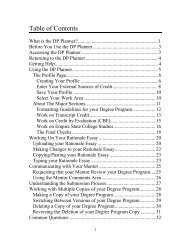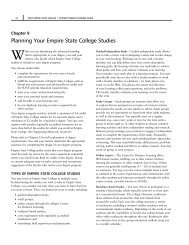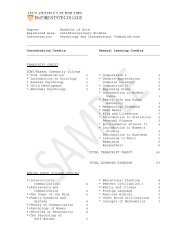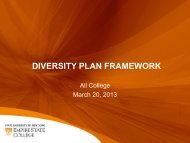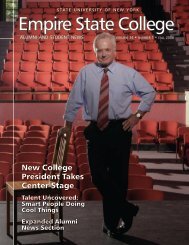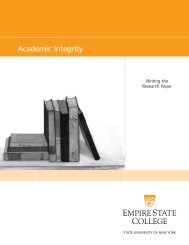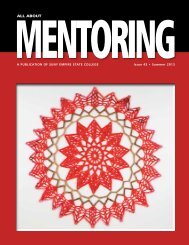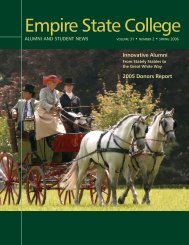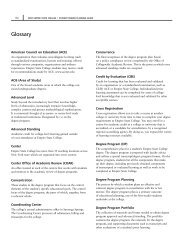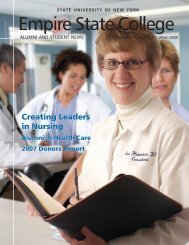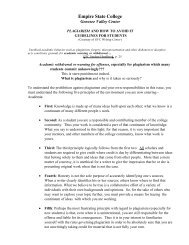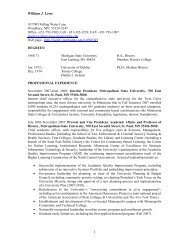Academic Plan 2011-2015 (PDF 524kB) - SUNY Empire State College
Academic Plan 2011-2015 (PDF 524kB) - SUNY Empire State College
Academic Plan 2011-2015 (PDF 524kB) - SUNY Empire State College
You also want an ePaper? Increase the reach of your titles
YUMPU automatically turns print PDFs into web optimized ePapers that Google loves.
32 <strong>SUNY</strong> <strong>Empire</strong> <strong>State</strong> <strong>College</strong>: <strong>Academic</strong> <strong>Plan</strong> <strong>2011</strong> - <strong>2015</strong>all students. In addition, AOSs need to examine their guidelines from the perspective of the student,and seek input from students, mentors and assessment professionals to identify issues that arise ininterpretation during the development of the degree program and review.Faculty development for the degree planning process is addressed by the college in a number ofways. At a center level, the center office of academic review often plays a primary role in orientingnew mentors to program review and their roles as center assessment committee members. The CMLoffers additional orientation to new mentors (which includes degree planning and PLA requests) andoffers collegewide workshops on educational planning and PLA. However, little has been done toprovide professional development for the center assessment committees at a collegewide level. Inaddition, the committees operate in a vacuum from each other, depending solely on the directors ofacademic review to ensure consistency across committees within a particular center, and there are nomechanisms in place to ensure consistency across centers. Thus, overall center assessment committeepractices need to be explored and strategies for improvement shared.Timeliness of the degree program development and review is another important factor that impactsstudent success and satisfaction. When programs are submitted and reviewed during the students’last or near last enrollment, there is very little time to make changes to the students’ degree program,especially when they think they have completed all of their requirements and will be graduating.Students become frustrated when they discover that they still have requirements to fulfill. Committeescan feel caught in a bind and may approve programs that would not have been approved or wouldhave received conditional approval, if submitted earlier. Recent data analysis indicates an increase indegree programs concurred within the last 16 credits instead of a decrease. Technologies have notbeen developed to provide accurate, up-to-date information regarding student progress, which wouldhelp faculty and center academic review offices appropriately advise students on their status. Thecollege needs to examine practices to determine why there is an increase in untimely concurrences anddevelop strategies to help students establish their programs earlier in their tenure.With student enrollments increasing, all centers are experiencing an increase in degree programssubmitted for approval. For example, overall the college experienced a 10 percent increase in concurreddegrees in 2010 – <strong>2011</strong>, as compared to 2009 - 2010. The college needs to examine the sustainabilityof current practices and seek new ways to effectively handle the volume of degree program reviewswhile maintaining quality and timeliness. In addition, there is a dearth of information regardingstudents who never complete the degree program submission, review and approval process. Furtherexploration into established practices and student persistence needs to take place in order to determinehow to improve degree program review and approval.Objective B4.7: Enhance graduation review processes and develop a degree audit systemAll centers are charged with developing a process by which a student’s degree program is reconciledwith completed <strong>Empire</strong> <strong>State</strong> <strong>College</strong> studies, determining if the completed program meets collegepolicy, and if the changes in <strong>Empire</strong> <strong>State</strong> <strong>College</strong> studies continue to fall within the parametersof what the committee has determined to be an approved program. In addition, the Office of theRegistrar is responsible for the final academic technical graduation review. The way in which centersaddress graduation review processes varies in terms of who is responsible for graduation review, therole that they play in the process, and what kinds of resources, if any, are available to them. Some



